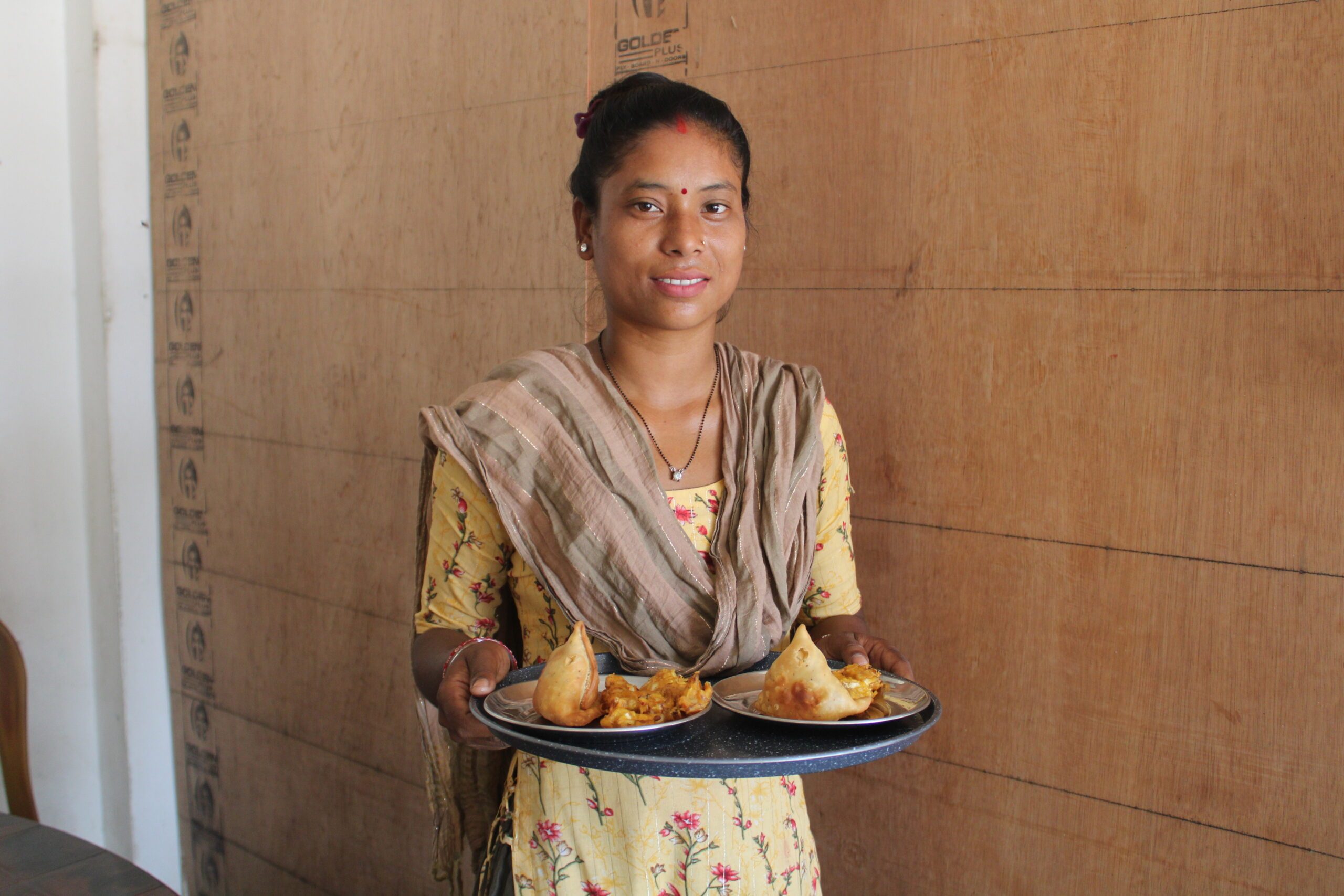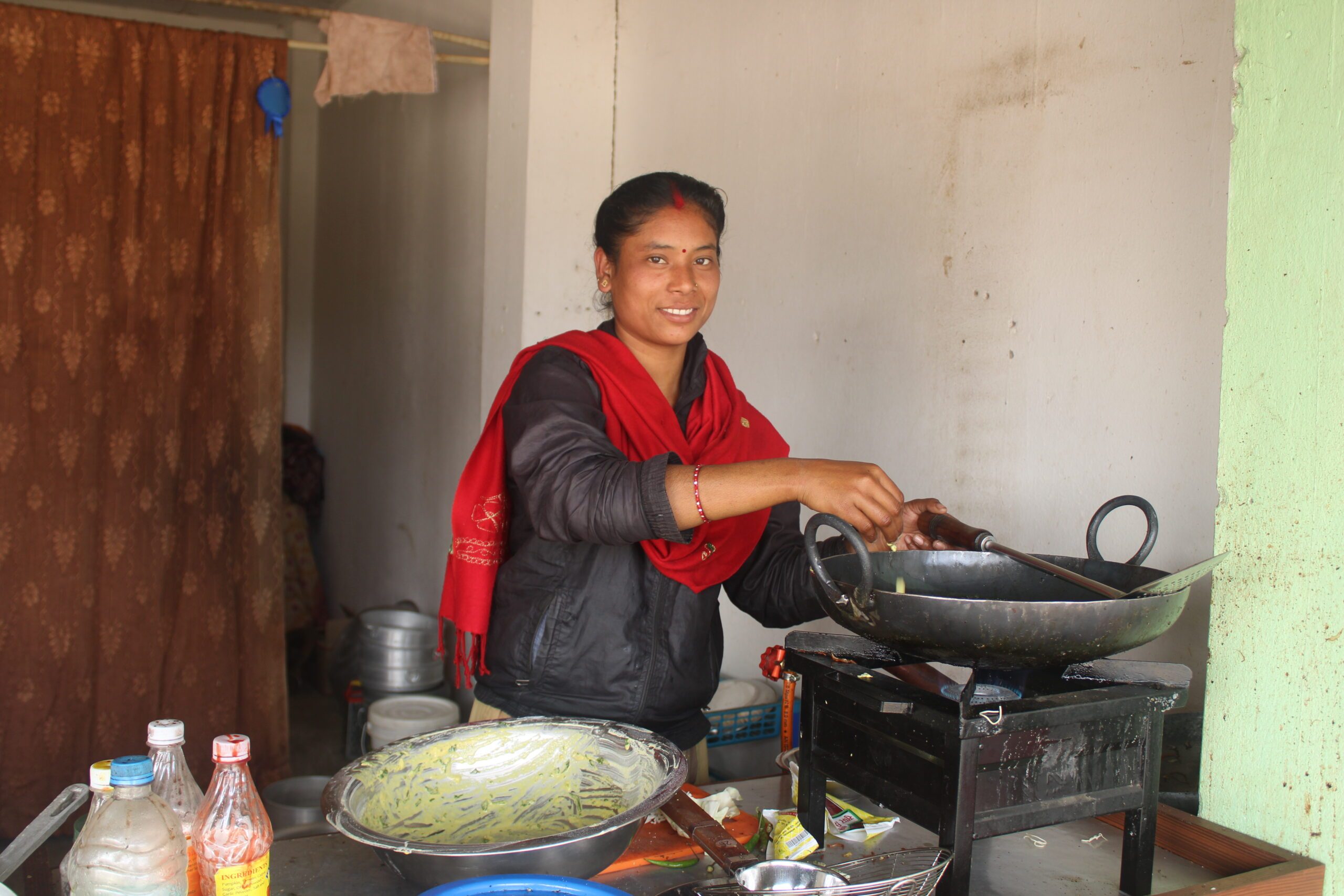Mamata’s journey from early marriage to entrepreneurship
Introducing Mamata, a diligent 23-year-old young woman from rural Nepal, Bardiya who is a cook by profession and runs a small restaurant serving breakfast in her village.

A cook by profession, Mamata, 23, runs a small breakfast restaurant in her village. “For me, cooking is not just about making food; it’s my way of sharing love and stories. I paint flavours that speak of home, and bring a taste of Nepal to every breakfast I serve”.
Early marriage and challenges
Mamata got married at 17, which meant she couldn’t finish school or get a good job. She dropped out of school in grade 10 after marrying Prem. With little work available in their remote village in Bardiya district, Prem often has to work away from home in India or Kathmandu. With the little money Prem earned as a mason, he looked after Mamata and their son, his parents, and younger siblings. With only one person earning an income, life was hard, so Mamata took on domestic work for other families in the village to help the family make ends meet.
Although the young couple talked about their problems, they were unable to find a long-term solution to the issues they faced. “In my family, we don’t talk much about money problems. There’s this old idea that men should work and earn, while women should concentrate on running the home. That’s the way it’s always been, but sometimes it’s hard to share the burden equally.”
Having always dreamed of owning her own business, Mamata thought of opening a restaurant. “My mother used to tease me, saying that I could run a snack shop because my food was delicious and offered the authentic flavours of our Tharu community’s cuisine.”
Cooking training and empowerment

Having never had any formal training in cooking, when Mamata heard about a project to train young women from marginalised communities in cooking and business skills as part of a programme to end the early marriage, she was excited to join. “I was thrilled. It was a chance to learn and grow while making a difference,” she says.
“I talked to my husband and discussed it with my in-laws. They were reluctant at first, but in the end, they supported me. My mother-in-law makes traditional sweets at home and sells them in the market. I convinced her that we could prepare them together and sell them professionally to generate income.”
By enrolling in the Council for Technical Education and Vocational Training programme, Mamata immersed herself in learning valuable culinary skills that not only enriched her passion for cooking but also empowered her to advocate against child marriage and for gender equality in her community.
“Learning business skills has taught me how to manage my finances wisely, market my products effectively, and provide excellent service to my customers. These skills have helped me shape my future and run my breakfast shop successfully,” says Mamata.
Launching and managing a breakfast shop
Outside the kitchen, Mamata actively participated in discussions and workshops on social issues, particularly the harmful effects of child marriage on girls’ lives. With her newfound knowledge and deep sense of empathy, she became a passionate advocate for ending child marriage, raising awareness among her peers and community members about the importance of girls’ education, empowerment, and equal opportunities.
After completing her training, Mamata set about organising the necessary equipment and materials to open her shop. With the seed capital provided by the project, she was able to purchase essential supplies and start trading.
“Opening my breakfast shop brought new challenges such as managing stock, catering to different customer tastes, and ensuring consistent quality. However, each challenge became an opportunity to grow and strengthen my business,” says Mamata.
Over time, Mamata has been able to adapt and diversify her menu to meet customer demand. Selling staples such as samosas, noodles, fritters, chaat, sweets, dumplings, and tea, she also caters to schoolchildren and passers-by, widening her customer base.
In the first 4 months of operation, Mamata’s breakfast shop made a healthy profit and she was proud to be able to support her family with the proceeds. “I feel fulfilled to be able to provide for my family’s needs and support my son’s education,” she explains. Mamata also learned the importance of saving money and became a member of a savings and credit cooperative, contributing 200 rupees monthly. Reflecting on her past struggles, she
recognises the progress she has made. “Despite the challenges, I refused to let my early marriage define my future.”
With her business thriving, Mamata hopes to expand her restaurant and serve a wider variety of food throughout the day. She now encourages other young women to pursue their passions and break the social norms that limit their potential. “By sharing my story and success in the culinary field, I hope to inspire others to challenge traditional gender roles.”
How we empower young women through training
Mamata participated in the Council for Technical Education and Vocational Training course organised by Plan International Nepal in collaboration with BEE Group, where she gained business and life skills. Additionally, she took part in discussions and workshops under the Child, Not Bride project to raise awareness on social issues.
At Plan International Nepal, we are dedicated to equipping our program participants with essential skills to thrive and lead transformative change in their communities.
- Life Skills Training: We teach essential life skills such as communication, problem-solving, and emotional resilience, helping participants navigate daily challenges with confidence.
- Business Training: Our business training empowers participants to start and manage their enterprises, fostering economic independence and innovation.
- Protection Training: We raise awareness about harmful traditional norms, such as child marriage, and equip participants to challenge these practices, promoting gender equality and safeguarding their rights.
By providing these trainings, we empower individuals to become change agents, inspiring positive transformation within their communities.


